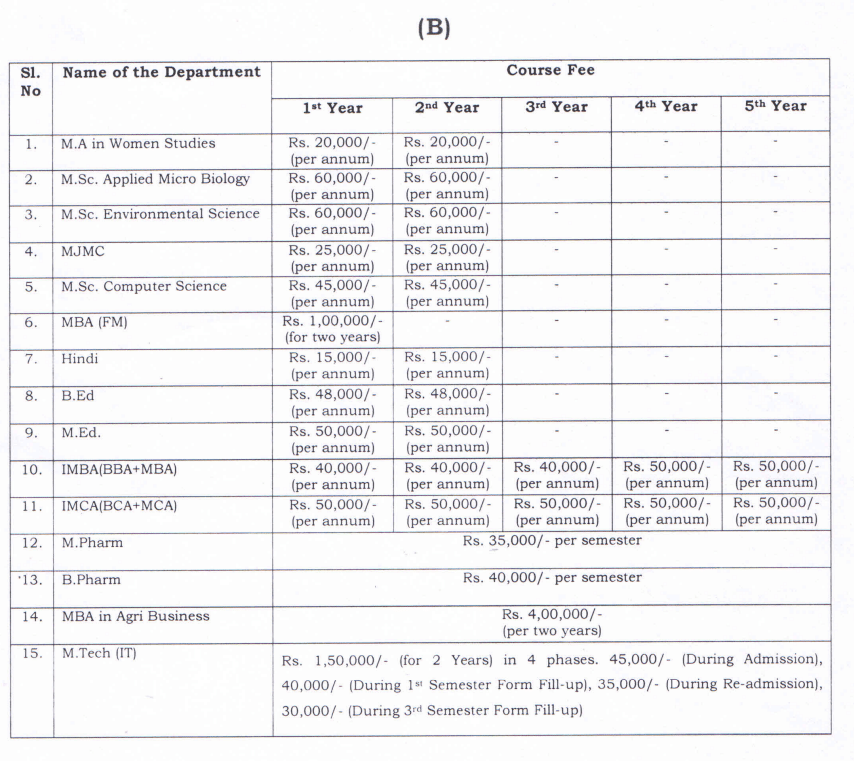The college admission process involves an Entrance Exam, Group Discussion, and Personal Interview, followed by a merit list. Although the placement rate is high, there is a noticeable disparity in job offers, with some graduates receiving significantly higher salary packages than others. The course, Agriculture Business Management (ABM), covers company insights, farmers' issues, business marketing, and arithmetic. Faculty members are experienced, mostly over 40, proficient in English, and maintain a supportive, harassment-free environment.
Finance and HR are the standout departments. However, there are concerns about partiality in marks and placements, and some challenging subjects are taught by guest faculties, which can be hard to grasp. The course structure includes 4 end-semester and 4 mid-semester exams and aligns well with industry standards. The college is deemed expensive, with a total tuition fee of INR 100,000 for a two-year MBA in Financial Management, and a hostel fee of INR 11,700.
Despite good infrastructure and accommodations, there are additional fees that may be misleading. The college does not offer scholarships, especially for out-of-state students. An approximate 60-day internship is required, offering valuable experience and stipends. The MBA program covers corporate finance, investment management, financial markets, international finance, and marketing of financial services. Students with strong faculty relationships tend to have better placement opportunities, while others might struggle to secure referrals. Despite financial commitments, the infrastructure is lacking, with poorly maintained classrooms and seminar halls.
The education and knowledge provided are viewed positively, but the college's costs are high compared to others offering similar courses at reduced prices.









.jpeg?h=78&w=78&mode=stretch)
![Kalinga Institute of Industrial Technology - [KIIT]](https://image-static.collegedunia.com/public/college_data/images/appImage/14878534504.jpg?h=111.44&w=263&mode=stretch)

![BJB Autonomous College - [BJB]](https://image-static.collegedunia.com/public/college_data/images/appImage/28310_cvr.png?h=111.44&w=263&mode=stretch)





![Directorate of Research on Women in Agriculture - [ICAR]](https://image-static.collegedunia.com/public/college_data/images/appImage/6615_ICAR_New.jpg?h=111.44&w=263&mode=stretch)

![Utkal University, Directorate of Distance and Continuing Education - [DDCE]](https://image-static.collegedunia.com/public/college_data/images/appImage/56909_app image utkal.jpg?h=111.44&w=263&mode=stretch)












![Utkal University of Culture - [UUC]](https://image-static.collegedunia.com/public/college_data/images/logos/1482306603logo1.png?h=72&w=72&mode=stretch)
![Utkal University, Directorate of Distance and Continuing Education - [DDCE]](https://image-static.collegedunia.com/public/college_data/images/logos/1473232343utkal university logo.jpg?h=72&w=72&mode=stretch)


.jpeg?h=72&w=72&mode=stretch)
.png?h=72&w=72&mode=stretch)

![Biju Patnaik University of Technology - [BPUT]](https://image-static.collegedunia.com/public/college_data/images/logos/15046162221421753246logo.png?h=72&w=72&mode=stretch)
![NIIS Institute of Information Science & Management - [NIIS]](https://image-static.collegedunia.com/public/college_data/images/logos/col3092.jpg?h=72&w=72&mode=stretch)


![Centurion University of Technology and Management - [CUTM]](https://image-static.collegedunia.com/public/college_data/images/logos/16189222067038315326908908642635764348829995527831552n.jpg?h=72&w=72&mode=stretch)
![Ravenshaw University - [RU]](https://image-static.collegedunia.com/public/college_data/images/logos/1394450344Ravenshaw University.png?h=72&w=72&mode=stretch)
![Siksha 'O' Anusandhan University - [SOA]](https://image-static.collegedunia.com/public/college_data/images/logos/1619098174SOAPNG.png?h=72&w=72&mode=stretch)
![Regional College of Management - [RCM]](https://image-static.collegedunia.com/public/college_data/images/logos/1678340131index.jpg?h=72&w=72&mode=stretch)

![Institute of Management and Information Technology - [IMIT]](https://image-static.collegedunia.com/public/college_data/images/logos/1501907990skj.gif?h=72&w=72&mode=stretch)
![BJB Autonomous College - [BJB]](https://image-static.collegedunia.com/public/college_data/images/logos/1482491677logo 1.png?h=72&w=72&mode=stretch)
![Sri Sri University - [SSU]](https://image-static.collegedunia.com/public/college_data/images/logos/1506508878logo.jpg?h=72&w=72&mode=stretch)

![Fakir Mohan University - [FMU]](https://image-static.collegedunia.com/public/college_data/images/logos/1482236259fakir-mohan-university.jpg?h=72&w=72&mode=stretch)
![Orissa University of Agriculture and Technology - [OUAT]](https://image-static.collegedunia.com/public/college_data/images/logos/1482315881logo.png?h=72&w=72&mode=stretch)



Comments